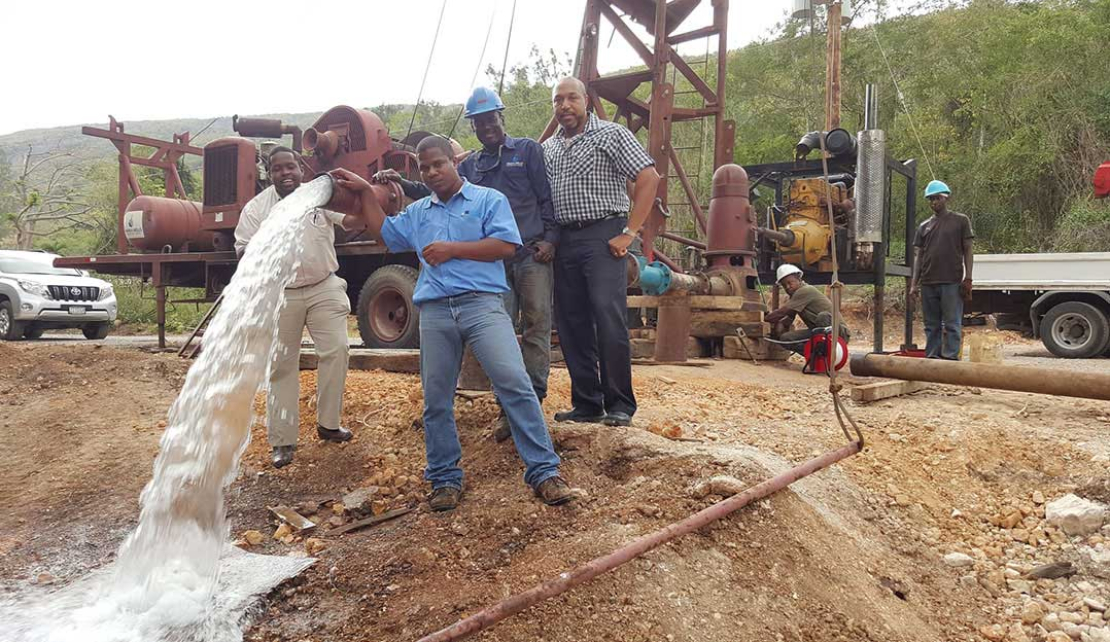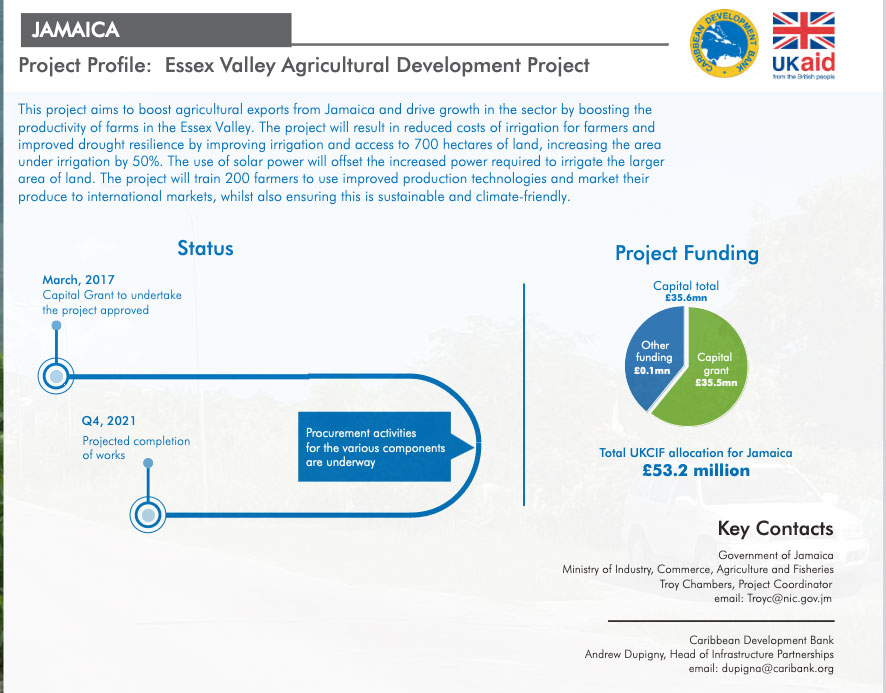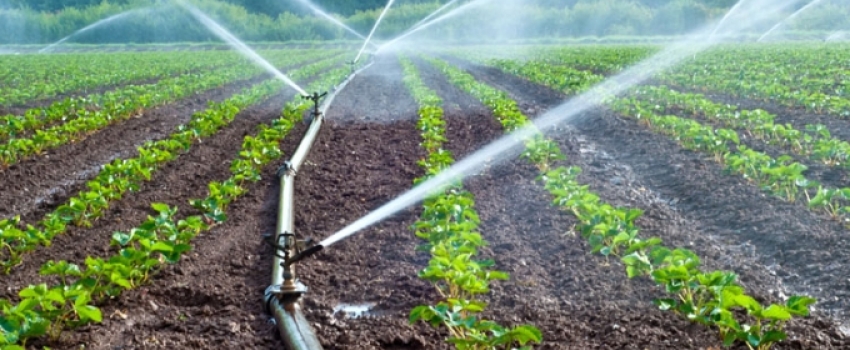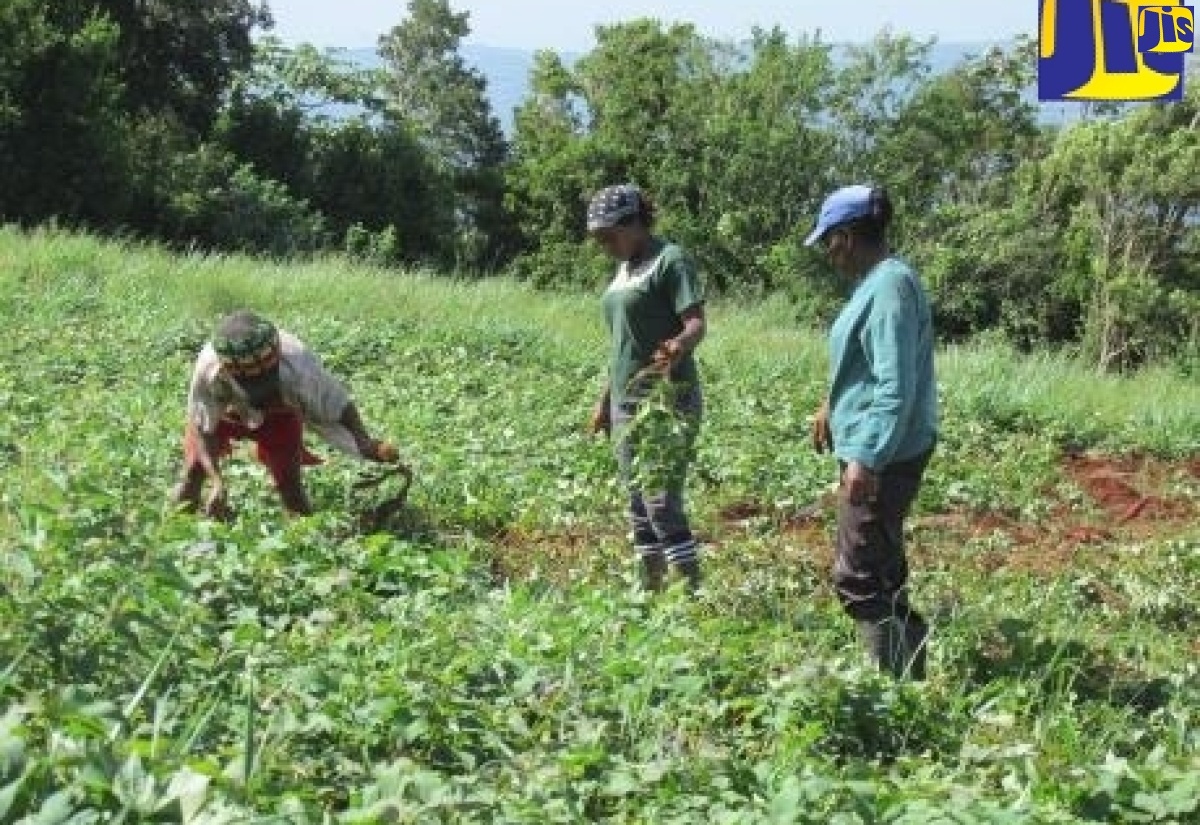Questions Surround Essex Valley £35-Million Water Project amidst Farmers financial losses

KINGSTON, Jamaica May 5, 2024 - A decade has passed since the announcement of the Essex Valley irrigation project in South St. Elizabeth, yet not a single drop of water has been delivered to the parched fields that were promised relief.
The project, which received a substantial grant of thirty five million pounds from England, remains an unfinished saga marked by management failures and shrouded in secrecy.
According to the JIS, approximately $1.9 billion has been allocated to continue work under the Essex Valley Irrigation Infrastructure Development Programme in the upcoming fiscal year.
Funding and Frustration
The project, initially greeted with optimism, now stands as a testament to bureaucratic inefficiency and wasted resources.
The massive JMD$ 6.5 billion financial grant was meant to revolutionize agriculture in one of the most fertile regions of Jamaica but has instead spiraled into what many locals describe as the "white elephant of the century."
Despite the significant investment, details about the project’s progression, or lack thereof, are scarce, both in local communities and at the Ministry of Agriculture, Fisheries, and Mining (MICAF&M).
Technical Troubles and Taxpayer Toll  In a glaring misstep, a critical pump intended to lift water from a depth of 500 feet was purchased, only to discover that the water source lay at a daunting 900 feet.
In a glaring misstep, a critical pump intended to lift water from a depth of 500 feet was purchased, only to discover that the water source lay at a daunting 900 feet.
This error necessitated the costly and time-consuming procurement of a custom-made pump from Germany, further burdening Jamaican taxpayers.
The oversight not only highlights the technical mismanagement but also the lack of appropriate project oversight and planning, exacerbating the financial strain on a community already suffering from prolonged droughts.
Impact on Local Farmers
The protracted delays and mismanagement have taken a heavy toll on the local farming community. Farmers in the area, who have faced severe drought conditions year after year, estimate that the stalled project has cost them billions in lost agricultural production.
The project's infamous nickname among the locals, the 'white witch of Rose Hall', reflects the despair and frustration felt by those who were supposed to benefit from it. Their livelihoods hang in the balance, with little recourse but to watch as potential profits turn to dust.
Seeking Alternative Solutions
Amidst mounting discontent, some farmers have proposed abandoning the beleaguered well altogether in favor of connecting to the Pepper water system located about 10 miles away.
This alternative promises a quicker and potentially more cost-effective means of bringing much-needed irrigation water to the vast Goshen farming area and the broader Essex Valley agricultural belt.
The National Irrigation Commission (NIC), now co-managing the project, hints at this being a feasible alternative that could finally deliver on the long-overdue promise of water.
A Glimmer of Hope for the Future

Investment in Irrigation for this parish is to be encouraged because it has the largest number of registered farmers which stands at 36000 more than St James, Hanover and Westmoreland combined.
The NIC already possesses infrastructure in Hounslow that could be extended to service the highly productive Pedro Plains zone, which has some of the most productive farmers in the Caribbean.
Furthermore, the northern part of the parish, Brumdeck, has sufficient surface water to potentially satisfy the needs of 60% of its farmers, paving the way toward a more resilient agricultural sector.
As we consider the implications of these developments, the Jamaica Agricultural Society is pressing MICAF&M for clear explanations and a definitive timeline for the project's completion.
The community's hope is that the lessons learned from the Essex Valley debacle will prevent future initiatives from suffering a similar fate.
According to the JIS, Among the programme’s targets for 2024/25 are: completing installation of irrigation pipes, fittings and meters; supplying and installing renewable energy plant to power the irrigation system; and constructing agricultural buildings.
Additionally, the Essex Valley and Southern Plains Agricultural Development Projects Area operational plan will be developed; and there will be continued engagement and support for community-based organisations, including vulnerable groups.
A Call for Transparency and Accountability

The Jamaica Agricultural Society has vocally demanded explanations for the lengthy delays and mishandling of the project, urging MICAF&M to provide a clear and immediate timeline for its completion.
Their call echoes the frustrations of the local farming community, who have suffered immense financial losses due to the project's mismanagement.
As Jamaica aims to enhance its food security through increased agricultural productivity, the Essex Valley project’s outcome could set a precedent for future infrastructure endeavors.
With approximately 10% of Jamaica's farmlands currently under irrigation, and having a potential to serve up to 50% of St. Elizabeth's farmers with efficient water management, the stakes are high.
The government and responsible agencies must not only resolve the current impasse but also ensure that the ambitious goals for regional agricultural development are not compromised by similar oversights.
According to the February report from the JIS, there have been several achievements under the programme up to December 2023.
These include the drilling of eight wells with five producing water. However a source close to the project has disclosed that while the wells have been drilled, they have yet to be commissioned by the NIC, nor has contractural with farmers been made.
Looking Forward -
The unfolding story of the Essex Valley irrigation project holds lessons for all stakeholders involved in public infrastructure and agricultural development.
It underscores the necessity of diligent planning, robust management, and unwavering accountability from all parties involved.
As the NIC takes steps toward remedying the situation, the hope remains that this project will eventually fulfill its promise, turning the page on its troubled past and ushering in a new era of prosperity for the farmers of Essex Valley.
As this situation develops, the community watches eagerly, hopeful that their voices will be heard and that the white witch of Rose Hall will finally be laid to rest, replaced by the flowing waters of progress and prosperity.
The project is slated to end in September 2025, which will make the gestation period for such a project the longest in Jamaica's history.
Government says it will be committing an additional $2.1 billion into the project to undertake activities in fiscal year 2025/26, if necessary.
-30-
